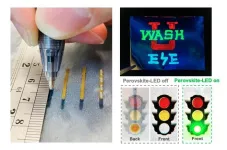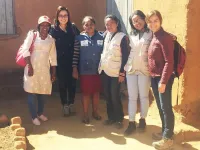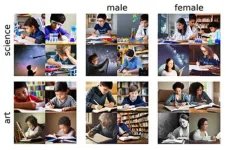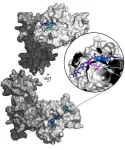(Press-News.org) Key Takeaways
Lung and heart transplant recipients experienced diminished and delayed antibody responses to the first two COVID-19 mRNA vaccine doses, but most developed stronger responses following a third dose
A third dose also boosted cross-protection against SARS-CoV-2 viral variants
For lung and heart transplant recipients, vaccine doses beyond the third dose are likely important for maintaining immunity
BOSTON – Transplant recipients must take life-long immunosuppressive medications to prevent rejection, but these drugs can compromise the effectiveness of vaccines.
New research indicates that lung and heart transplant recipients experienced diminished and delayed antibody responses to the first two COVID-19 mRNA vaccine doses, but most developed significantly better responses following a third dose. Cross-protection of vaccination against SARS-CoV-2 viral variants was only partial, however.
The study, which was conducted by a team led by investigators at Massachusetts General Hospital (MGH) and is published in Open Forum Infectious Diseases, included 18 lung transplant recipients, 17 heart transplant recipients, 7 non–lung-transplanted patients with cystic fibrosis, and 12 healthy individuals (all without SARS-CoV-2 infection).
Scientists measured blood levels of antibodies against different variants of SARS-CoV-2 at various time points after a primary mRNA COVID-19 vaccination series.
Among healthy controls, strong antibody responses to the SARS-CoV-2 spike protein arose immediately following vaccination and displayed cross-neutralization against all variants.
Among heart and lung transplant recipients, increases in antibody concentrations occurred only gradually following the first two vaccine doses, and cross-neutralization was less than 10% against variants (and completely absent against the Omicron variant).
Most (73%) transplant recipients developed a significant response after the third vaccine dose, however, reaching levels comparable to those of healthy controls, with improved but lower level responses against Beta, Gamma, and Omicron variants. Responses of non–lung-transplanted cystic fibrosis patients paralleled those of healthy controls.
“Our findings highlight that effective protection of most transplant recipients is achievable but requires the recommended additional doses of vaccine. However, for most individuals, cross-protection of their responses to currently circulating immune-evasive SARS-CoV-2 variants is attenuated. The multiple subsequent vaccine doses recommended for transplant recipients are likely critical for maintaining immunity,” says co–senior author Marcia B. Goldberg, MD, an investigator in the Division of Infectious Diseases at MGH and a professor in the Departments of Medicine and Microbiology at Harvard Medical School. “Next steps are to analyze the cellular immune responses of solid organ transplant recipients over the same longitudinal time frame.”
Additional co-authors include May Y. Liew, Josh I. Mathews, Amy Li, Rohan Singh, Salvador A. Jaramillo, Zoe F. Weiss, Kathryn Bowman, Pierre O. Ankomah, Fadi Ghantous, Gregory D. Lewis, Isabel Neuringer, Natasha Bitar, Taryn Lipiner, Anand S. Dighe, Camille N. Kotton, Michael S. Seaman, and co–senior author Jacob E. Lemieux.
This work was supported by a Clinical Research Award from the Cystic Fibrosis Foundation (002211321, to MBG), a Mendez National Institute of Transplantation Foundation award (to MBG), and an American Lung Association COVID-19 Action Initiative Special Research Award (to MBG).
About the Massachusetts General Hospital
Massachusetts General Hospital, founded in 1811, is the original and largest teaching hospital of Harvard Medical School. The Mass General Research Institute conducts the largest hospital-based research program in the nation, with annual research operations of more than $1 billion and comprises more than 9,500 researchers working across more than 30 institutes, centers and departments. In July 2022, Mass General was named #8 in the U.S. News & World Report list of "America’s Best Hospitals." MGH is a founding member of the Mass General Brigham healthcare system.
END
Transplant recipients experience limited protection with primary COVID-19 vaccination series, but third dose boosts response
A third dose also boosted cross-protection against SARS-CoV-2 viral variants
2023-08-10
ELSE PRESS RELEASES FROM THIS DATE:
Department of Energy announces $11 million for exploratory research in extreme-scale science
2023-08-10
WASHINGTON, D.C. - Today, the U.S. Department of Energy (DOE) announced $11 million in funding for 15 projects in exploratory research for extreme-scale science that will leverage emerging trends and advances in high-end computing, massive datasets, scientific machine learning, artificial intelligence, and novel computing architectures.
“There is a wide expanse of exciting opportunities as we reach beyond exascale computing,” said Ceren Susut, DOE Acting Associate Director of Science for Advanced Scientific Computing Research. “These ...
Simple ballpoint pen can write custom LEDs
2023-08-10
Researchers working with Chuan Wang, an associate professor of electrical and systems engineering at the McKelvey School of Engineering at Washington University in St. Louis, have developed ink pens that allow individuals to handwrite flexible, stretchable optoelectronic devices on everyday materials including paper, textiles, rubber, plastics and 3D objects.
In a paper published Aug. 7 in Nature Photonics, the team reports their simple and versatile fabrication approach to allow anyone to make a custom light-emitting diode (LED) or photodetector ...
Community health program boosts child vaccinations in remote areas of Madagascar
2023-08-10
URBANA, Ill. – Madagascar is one of the poorest countries in the world and access to health care is limited for many people. Childhood vaccinations are a crucial component of preventative care, but vaccination rates remain below the World Health Organization’s goal of reaching 95% of children. A new study from the University of Illinois Urbana-Champaign examines the effectiveness of a health intervention program that enlists community-based health workers to promote child vaccination uptake.
“Childhood vaccinations are a cost-effective investment that can have large ripple effects. Vaccines can reduce child mortality ...
Athletes have no reason to be concerned by their COVID-19 vaccine this winter but timing matters
2023-08-10
It is now almost a rule of thumb: As soon as an athlete falls to the ground with a sudden cardiac arrest, social media is awash with claims that COVID-19 vaccinations are to blame. This was the case with English footballer Charlie Wyke, cyclist Sonny Colbrelli and, most recently, with college basketballer, and son of LeBron, Bronny James. In the view of Harald Jorstad, Sports Cardiologist at Amsterdam UMC, there is no evidence to support these claims, but timing of the vaccination can be structured to not ...
Microplastics found embedded in tissues of whales and dolphins
2023-08-10
BEAUFORT, N.C. – Microscopic plastic particles have been found in the fats and lungs of two-thirds of the marine mammals in a graduate student’s study of ocean microplastics. The presence of polymer particles and fibers in these animals suggests that microplastics can travel out of the digestive tract and lodge in the tissues.
The study, slated for the Oct. 15 edition of Environmental Pollution, appeared online this week.
Harms that embedded microplastics might cause to marine mammals are yet to be determined, ...
Tool finds bias in state-of-the-art generative AI model
2023-08-10
Text-to-image (T2I) generative artificial intelligence tools are increasingly powerful and widespread tools that can create nearly any image based on just a few inputted words. T2I generative AI can create convincingly realistic photos and videos which are being used more and more for a multitude of purposes, from art to political campaigning.
However, the algorithmic models that power these tools are trained on data from humans, and can replicate human biases in the images they produce, such as biases around gender and skin tone. These biases can harm marginalized populations, reinforcing stereotypes and potentially leading to discrimination.
To address these implicit biases, ...
Chloride Ions From Seawater Eyed As Possible Lithium Replacement In Batteries of the Future
2023-08-10
Sodium, Potassium and zinc have all been promising contenders for lithium’s place in rechargeable batteries of the future, but researchers at Worcester Polytechnic Institute (WPI) have added an unusual and more abundant competitor to the mix: chloride, the richest negatively charged ions in seawater.
Xiaowei Teng, the James H. Manning professor of Chemical Engineering at WPI, has discovered a new redox chemistry empowered by chloride ions for the development of seawater green batteries.
Modern lithium-ion batteries used in various applications, including electric vehicles, can be problematic for grid storage, given their ...
Mechanism underlying bacterial resistance to the antibiotic albicidin revealed
2023-08-10
A new analysis shows that infectious bacteria exposed to the antibiotic albicidin rapidly develop up to a 1,000-fold increase in resistance via a gene amplification mechanism. Mareike Saathoff of Freie Universität Berlin, Germany, and colleagues present these findings August 10th in the open access journal PLOS Biology.
Bacterial resistance to antibiotics is a growing problem associated with millions of deaths around the world every year. Understanding how bacteria evolve resistance is key to developing more effective antibiotics and strategies for using them.
In recent years, albicidin has emerged as a promising antibiotic capable of killing a wide range of bacterial species ...
Researchers engineer bacteria that can detect tumor DNA
2023-08-10
Pushing into a new chapter of technologically advanced biological sensors, scientists from the University of California San Diego and their colleagues in Australia have engineered bacteria that can detect the presence of tumor DNA in a live organism.
Their innovation, which detected cancer in the colons of mice, could pave the way to new biosensors capable of identifying various infections, cancers and other diseases.
The advancement is described Aug. 11, 2023, in the journal Science. Bacteria previously have been designed to carry out various diagnostic and therapeutic functions, but lacked the ability to identify specific DNA sequences and mutations outside ...
Climate modeling reveals new insights into hominin migration and evolution
2023-08-10
In two studies, researchers demonstrate how climate modeling approaches can fill gaps in our understanding of hominin evolution and migration.
Over the last several decades, research efforts into the lives of hominins – humans and their close ancestors – have shifted from identifying fossils and artifacts to understanding the environmental and climate settings in which they lived and how these factors could have influenced hominin evolution and migration. However, like the hominin fossil record, environmental and climate records that accurately capture environmental change and span the period over which ...
LAST 30 PRESS RELEASES:
Does mental health affect mortality risk in adults with cancer?
EANM launches new award to accelerate alpha radioligand therapy research
Globe-trotting ancient ‘sea-salamander’ fossils rediscovered from Australia’s dawn of the Age of Dinosaurs
Roadmap for Europe’s biodiversity monitoring system
Novel camel antimicrobial peptides show promise against drug-resistant bacteria
Scientists discover why we know when to stop scratching an itch
A hidden reason inner ear cells die – and what it means for preventing hearing loss
Researchers discover how tuberculosis bacteria use a “stealth” mechanism to evade the immune system
New microscopy technique lets scientists see cells in unprecedented detail and color
Sometimes less is more: Scientists rethink how to pack medicine into tiny delivery capsules
Scientists build low-cost microscope to study living cells in zero gravity
The Biophysical Journal names Denis V. Titov the 2025 Paper of the Year-Early Career Investigator awardee
Scientists show how your body senses cold—and why menthol feels cool
Scientists deliver new molecule for getting DNA into cells
Study reveals insights about brain regions linked to OCD, informing potential treatments
Does ocean saltiness influence El Niño?
2026 Young Investigators: ONR celebrates new talent tackling warfighter challenges
Genetics help explain who gets the ‘telltale tingle’ from music, art and literature
Many Americans misunderstand medical aid in dying laws
Researchers publish landmark infectious disease study in ‘Science’
New NSF award supports innovative role-playing game approach to strengthening research security in academia
Kumar named to ACMA Emerging Leaders Program for 2026
AI language models could transform aquatic environmental risk assessment
New isotope tools reveal hidden pathways reshaping the global nitrogen cycle
Study reveals how antibiotic structure controls removal from water using biochar
Why chronic pain lasts longer in women: Immune cells offer clues
Toxic exposure creates epigenetic disease risk over 20 generations
More time spent on social media linked to steroid use intentions among boys and men
New study suggests a “kick it while it’s down” approach to cancer treatment could improve cure rates
Milken Institute, Ann Theodore Foundation launch new grant to support clinical trial for potential sarcoidosis treatment
[Press-News.org] Transplant recipients experience limited protection with primary COVID-19 vaccination series, but third dose boosts responseA third dose also boosted cross-protection against SARS-CoV-2 viral variants






